高中英语语法 代词课件(63张ppt)
图片预览
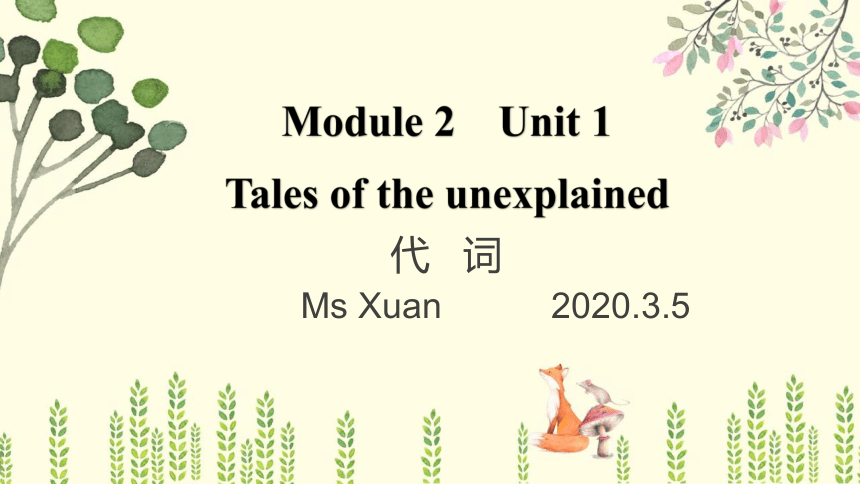
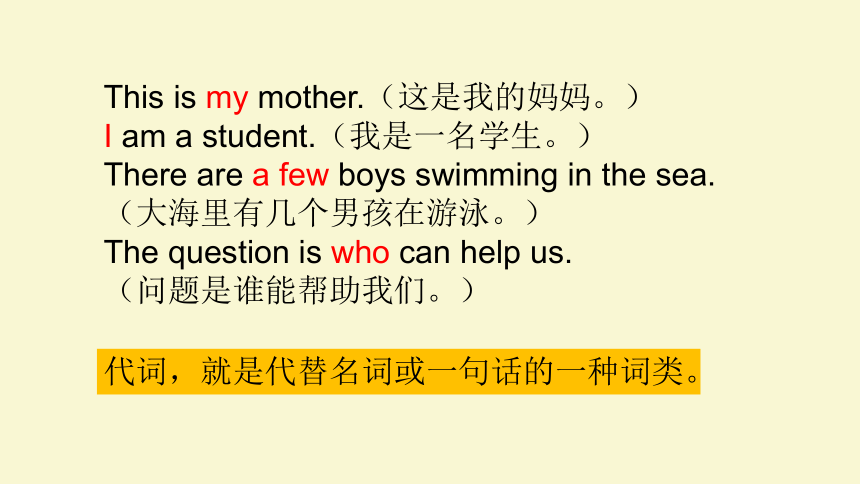
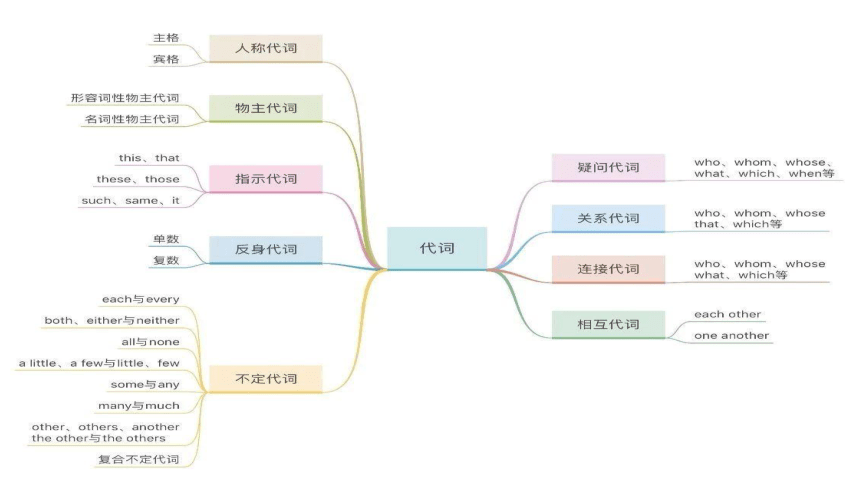
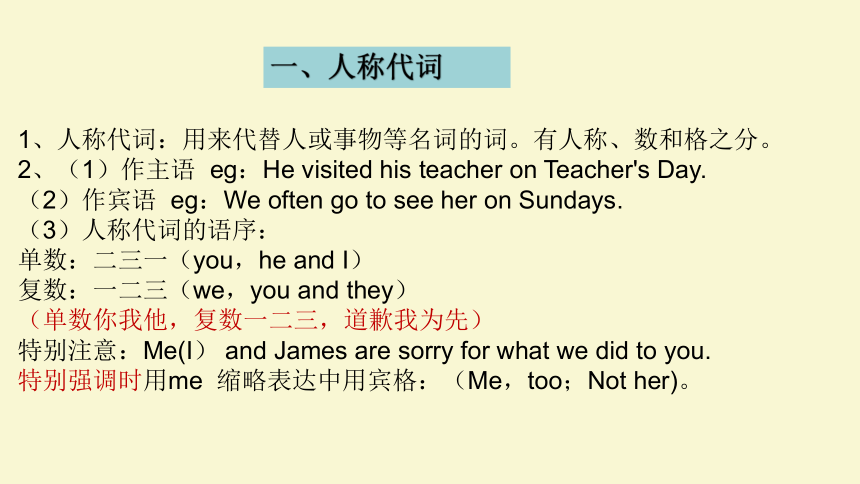
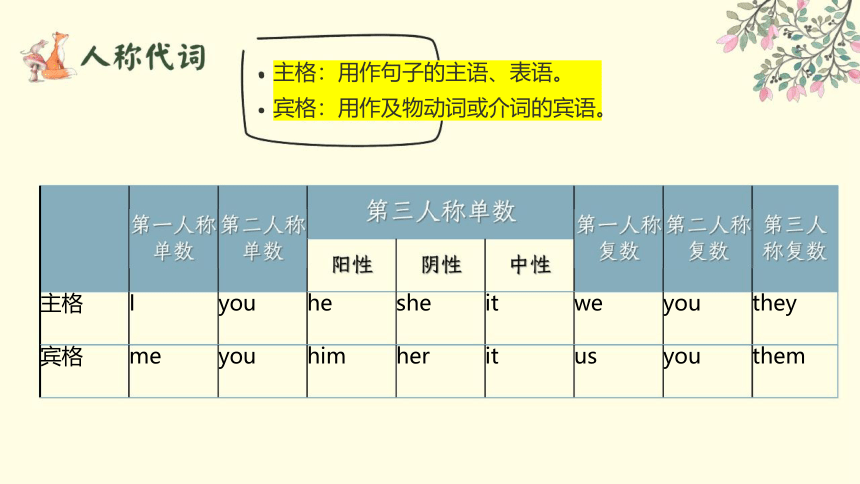
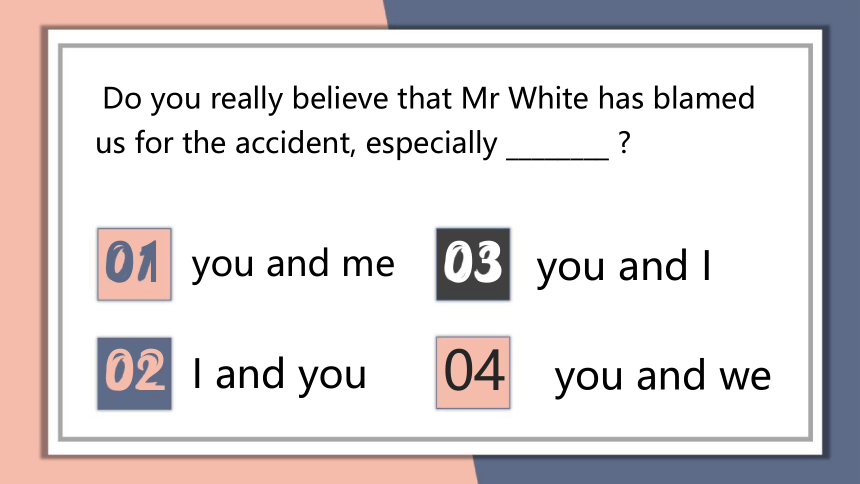

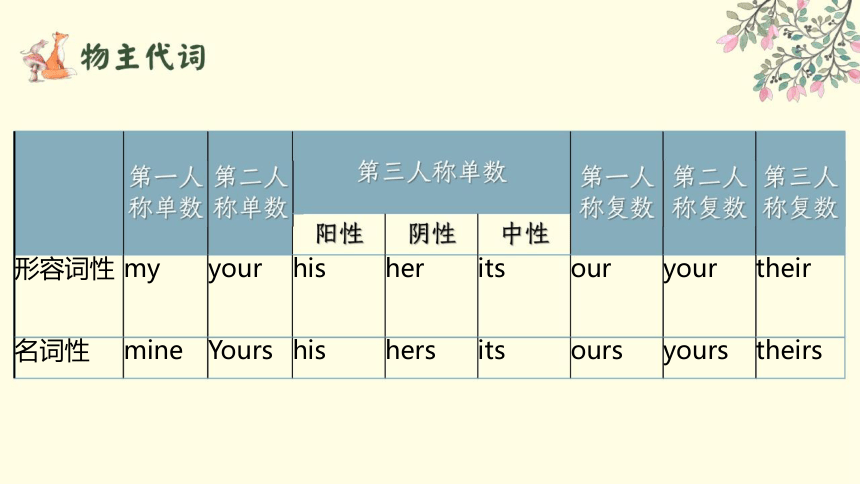
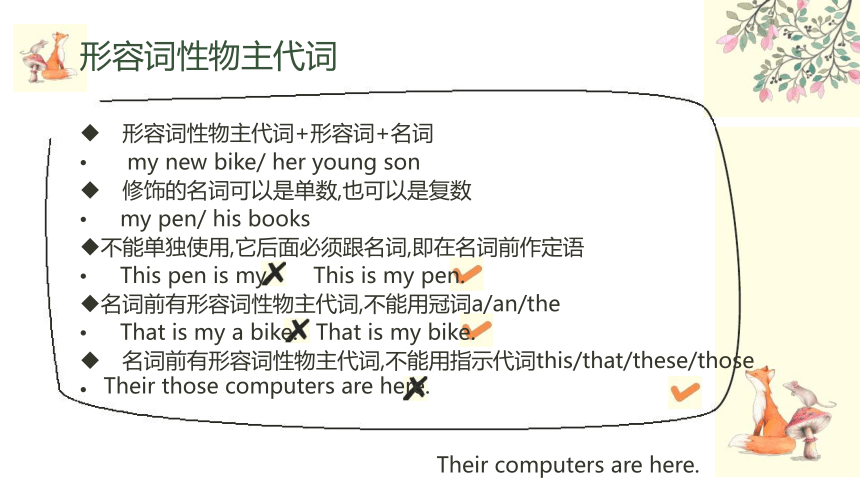
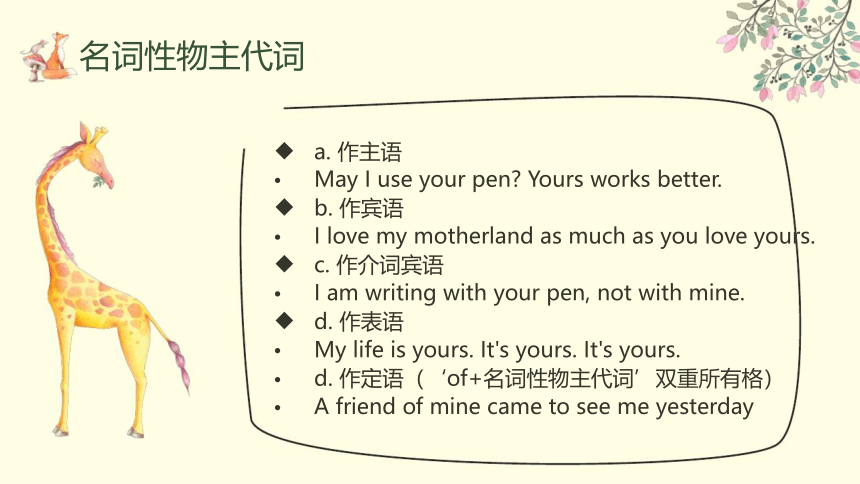

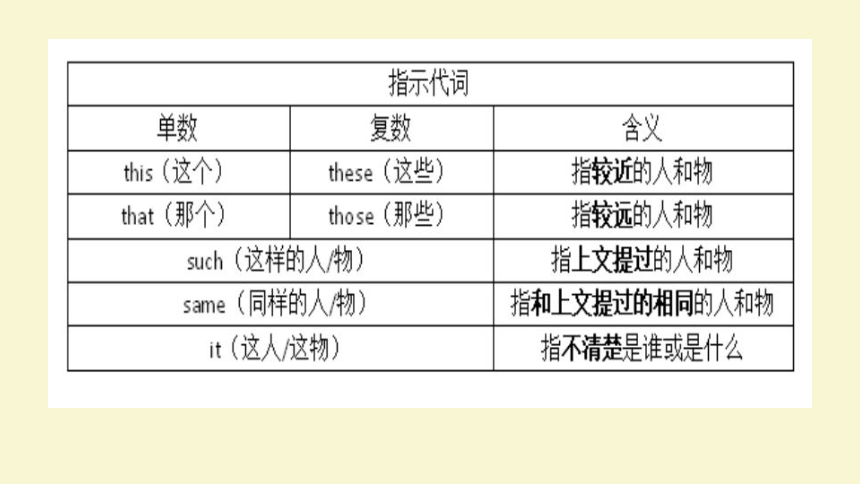
文档简介
(共63张PPT)
Ms Xuan 2020.3.5
代 词
Module 2 Unit 1
Tales of the unexplained
This is my mother.(这是我的妈妈。)
I am a student.(我是一名学生。)
There are a few boys swimming in the sea.(大海里有几个男孩在游泳。)
The question is who can help us.
(问题是谁能帮助我们。)
代词,就是代替名词或一句话的一种词类。
1、人称代词:用来代替人或事物等名词的词。有人称、数和格之分。
2、(1)作主语 eg:He visited his teacher on Teacher's Day.
(2)作宾语 eg:We often go to see her on Sundays.
(3)人称代词的语序:
单数:二三一(you,he and I)
复数:一二三(we,you and they)
(单数你我他,复数一二三,道歉我为先)
特别注意:Me(I) and James are sorry for what we did to you.
特别强调时用me 缩略表达中用宾格:(Me,too;Not her)。
一、人称代词
主格 I you he she it we you they
宾格 me you him her it us you them
?
?
主格:用作句子的主语、表语。
宾格:用作及物动词或介词的宾语。
Do you really believe that Mr White has blamed
us for the accident, especially ________ ?
01
02
you and me
I and you
03
04
you and I
you and we
物主代词
?
?
形容词性物主代词作定语,相当
于一个形容词,不能单独使用
名词性物主代词,相当于一个名
词词组,可以单独使用,既代替事物,
又表明所属关系。作主语、宾语、
表语、和介词of连用。
表示所有关系的代词。
(1)需放在名词前面。
例如:our teacher(我们的老师)
my car(我的汽车)
his kite(他的风筝)
名词性物主代词
= 形容词物主代词+名词
例如:
This is my book.(这是我的书。)
=This book is mine.
(这本书是我的。)
That is her desk.
(那是她的课桌。)
=That desk is hers.
(那个课桌是她的。)
Miss Wang is an old friend of mine.
形容词性 my your his her its our your their
名词性 mine Yours his hers its ours yours theirs
形容词性物主代词
? 形容词性物主代词+形容词+名词
?
my new bike/ her young son
? 修饰的名词可以是单数,也可以是复数
?
my pen/ his books
?不能单独使用,它后面必须跟名词,即在名词前作定语
?
This pen is my.
This is my pen.
?名词前有形容词性物主代词,不能用冠词a/an/the
?
That is my a bike.
That is my bike.
? 名词前有形容词性物主代词,不能用指示代词this/that/these/those
?
Their those computers are here.
Their computers are here.
名词性物主代词
?
?
?
?
?
?
?
?
?
?
a. 作主语
May I use your pen? Yours works better.
b. 作宾语
I love my motherland as much as you love yours.
c. 作介词宾语
I am writing with your pen, not with mine.
d. 作表语
My life is yours. It's yours. It's yours.
d. 作定语(‘of+名词性物主代词’双重所有格)
A friend of mine came to see me yesterday
指示代词
指示说明近处或者远处、上文或者下文、以前或者现在的人或事物。
例如:
This is my father.(这是我父亲。)
I love these books but I dislike those ones.(我喜欢这些书,但不喜欢那些。)
We have never met such a difficult problem.(我们从来没有遇到过这么难的问题。)
At the shop, they wanted to show me all the
dresses, but I was interested only in ________ in
the window.
01
02
this
that
03
04
it
the one
—What can I do for you?
—I’d like to buy a book, ________ that was
written by Lu Xun.
01
02
which
one
03
04
but
all
myself yourself himself herself itself ourselves yourselves themselves
反身代词
(1)作宾语和表语,表示“……自己”
That young man has been teaching himself French.
That poor boy living alone by himself was myself.
(2)作名词,代词的同位语,加强语气,表“亲自,本人”
You had better ask the patient himself about his trouble.
I myself did the task.
反身代词可用在一些固定短语中
例如:
by oneself(独自) devote oneself to 献身于
say/talk to oneself(自言自语)dress oneself 打扮;自己穿衣服
enjoy oneself(玩得高兴) seat oneself 就座
help oneself to(随便吃/喝些……) of oneself自动地
make oneself at home不要客气 for oneself 为自己/亲自
look after oneself 照顾自己 lose oneself in沉浸/陶醉于
1.The man is rich,he can buy___a lot of things.
A. he B. his C. himself D. him
2. --- What a lovely card ! Where did you buy it?
---I made it by______.
A. me B. myself C. itself D. yourself
3.“Help_______to some chicken ,"my mother said to the guests.
A. yourself B. yourselves
C. yours D. you
疑问代词
用来提出问题的代词称为疑问代词。
(1)who在句中多用于主语或表语 who ?told ?you?
Who are they? They are Peter's sisters.
(2)Whom作介词或动词的宾语
To whom did she send the book?
Whom ?did ?they ?invite?
(3)whose表示“谁的”可作定语,主语,表语和宾语
They all can speak English .Whose pronunciation is the best?
Whose is better ,yours or hers?
Whose are these?
Whose do you prefer?
(4)What和Which都可充当主语,宾语和定语,
另,what 有时也可以作表语
Which is your seat?
What should we do about it ?
Which do you prefer, the red one or the white one?
What job do you want to find?
What is your sister?
what与 which的用法区别
? 当选择的范围较明确时,用 which;当选择的
范围不明确时,用 what
? Which color do you like, red, black or white?
红色、黑色和白色,你喜欢哪种?
? What color is your car? 你的汽车是什么颜色的?
what的特殊翻译方法
What's the population? (人口)
What's the distance? (距离)
What's the price? (价格)
What's the address? (地址)
What's the attitude? (态度)
What's the length, width, height, depth, weight,size? (长 ,宽,高,深,重,面积)
不定代词
1.all,both,either,any,none,neither
all, both
all (用于三者或三者以上)与both (用于两上有很多相似之处,现放在一起讲述如下:
1.与定冠词、指示代词、形容词性物主代词、名词所有格等连用时,应放在这些词之前而不是之后,并且一般还可在它们之间加介词of。如:
All (Both) of the books are interesting.
All (Both) the books are interesting.
All (Both) of her children live abroad.
All (Both) her children live abroad.
2.在人称代词之前只能用all of/ both of
如:
正: All (Both) of us are interested in it.
我们所有的人(两人)都对它有兴趣。
误: All (Both) us are interested in it.
正: All (Both) children like toys.
所有(两个)孩子都喜欢玩具。
正: All (Both) of children like toys.
3.两者均可与否定词连用,且均构成部分否定。
如:
Not all Americans like hamburgers.
Not both the girls like the same dress.
4. all有时单独使用,笼统地表示所有的人,通常具有复数意义;或笼统地表示所有的事物或现象等,此时通常具有单数意义。
如:
All is well with us.
All are present today.
比较:
AlI is silent.
All are silent.
这样用的all还可后接定语从句,指事物时通常用all that..的形式,指人时通常用all (those)who..这样的形式。如:
All that glitters is not gold.
He has done all that is necessary.
5.单独使用的both无论表示人还是事物,均具有复数意义。
如:
Both were offered jobs immediately.
There were two dogs on the porch. Both were fast asleep.
both, either, neither★★
both, either和neither都可表示“两者”。三者的区别是:
both用于指“两者都”,谓语动词用复数形式;both后常跟of短语,其后可用复数名词或复数代词,后接复数名词时of常可省略,后接复数代词时of则不能省略:常用于
“both...and..."结构,连接两个结构平行的人或物。either用于指“两者中任何一个”。neither用 于指“两者都不"。
either..or..和"neither..nor..为常用搭配,其后的谓语动
词根据“就近原则"和所连接的名词或代词在数上保持一致。
例: Both (of) my children are at school now.
Both of us can speak English.
I felt both excited and worried.
There's coffee or tea- -you can have either.
Neither of us agrees on the plan.
If either John or Mary is here, they will get the message.
Neither the boys nor the girls are to blame.
Example
There are two windows in his bedroom.______ of
them face south, overlooking a beautiful park.
A. Both
B. One
C. The two
D. Either
The research group produced two reports based on the survey,
but neither contained any useful suggestions.
以这个调查为基础,研究团队做了两个报告,
但是两个都不包含任何有用的建议。
—When shall I call,in the morning or afternoon?
——我什么时候(给你)打电话方便,上午还是下午?
—Either.I'll be in all day.
——都可以,我将一整天都在家。
all, every, each
1.三者都可用来概括全体,但强调重点不同: all (全部)
是整体性地考虑总体(具有概括性),every(每个)是考虑总体中的所有成员(与all很接近),each (每个)是逐个逐个地考虑总体(具有个别性)。比较:
All men die.
Every man dies.
Each man must die alone.
all和each既可作形容词(其后接名词),也可用作代词(单独使用或后接of短语);而every却只能用作形容词(其后接名词),不能用作代词(即不能单独使用或后接of短语)。
如: .
正: all books / Each is good.所有的书/每个都很好。
误: every of the books / Every is good.
each和every之后通常接单数可数名词,用作主语时,
其谓语动词用单数。如:
Each (man) does his own work.
Every student in the school passed the swimming test.
若后接两个用and连接的名词,其谓语依然用单数。.
如:
Every [Each] man and woman knows it.
each指两者或两者以上的“每个”,every三者以上“每个”,因此指两者时只能用each
There are trees on each side of the road.
every可受almost, nearly等副词的修饰,但each却不能。如:
差不多每个学生都读过这本书。.
正: Almost every student has read the book.
误: Almost each student has read the book.
2.none,nothing,no one/nobody
Exercise:
①Nobody/No one can speak Chinese. None of them can speak Chinese.
④- What's in the box?- Nothing. ⑤- Who is in the room?一 Nobody/No one. ⑥一How many people are there in the park? 一None. ⑦There are many books in the room, but none is mine. ⑧I need some students to help me to carry the tools for the experiment,but there is none.
②Are there any pictures on the wall? 墙上有画吗?
None. 没。
Even if the answer seemed a little strange,nobody but I doubted it.
尽管这个答案好像有点奇怪,但是除了我之外没人怀疑它的正确性。 Niki is always full of ideas,but none is useful to my knowledge. 尼基点子总是很多,但是据我所知,没有一个是有用的。
—Daddy, which of these smart hats do you like best in
the hat shop?
— ____. They are both expensive and less warm-keeping.
01
02
Either
Nothing
03
04
Neither
None
His earliest plays are excellent, but his latest
one is ________ .
01
02
something
everything
03
04
anything
nothing
—Did ________ of your parents come to attend the
opening ceremony?
— ________ of them came.
01
02
any; None
any; Neither
03
04
either; Neither
either; Any
He told me he would tell us ______.
01
02
surprising
something
surprised
something
03
04
something
surprising
something
surprised
You have just read this newspaper. Did you
find_______ in it?
01
02
interesting
anything
anything
interesting
03
04
interesting
something
something
interesting
3.other,the other,others,the others,another
To warm himself,the sailor sat in front of the fire rubbing one bare foot against the other.
为了暖和自己,那个海员坐在火堆前,两只光脚丫互相蹭着。 In some countries,people eat with chopsticks,while in others,knives and forks.
在一些国家,人们用筷子吃饭,而在另外一些国家,人们用刀叉吃饭。
Some of the wheat came from Canada.
How about ________ ?
01
02
another
the others
03
04
the other
the rest
I won’t trust him. He says one thing to your
face but does ________ behind your back.
01
02
other
the other
03
04
the others
another
不定代词
? some 与 any。some 用于肯定句中,any 用于否定句、疑问句和条件
句中。但是,在表示请求、邀请或征求意见的句子中,通常要用
some 而不用any
? Will you lend me some money?
? Why don't you bring some flowers?
?指两者和三者的不定代词。有些不定代词用于指两者(如both, either,
neither),有的不定代词用于指三者(如all, any, none, every),具体使用
?
?
?
时要根据一定的上下文正确选用
He is blind in both eyes
Were they all college students?
There are trees on each side of the road.
(a) few 与 (a) little
? few和a few 后接复数名词,而little和a little后接不可数名
词。其中不带不定冠词的 few 和 little表示数量很少或几乎
没有,强调“少”,含有否定意义;而带有不定冠词的a
few 和 a little 则表示数量虽然少但毕竟还有,强调“有”,
含有肯定意义
?
?
?
?
He knew few of them. 他们中间他认识的人很少。
He sold only a few of the papers. 他只卖出了几份报纸。
He knew little about it. 他对此知道得很少。
There is still a little left. 还剩一点点。
all, every, each
?从强调重点上看:all强调整体地考虑总体,every 强调考虑总体中的
所有成员(与all很接近),each则强调逐个逐个地考虑总体
?从用法上看:all和each既可单独使用,也可后接名词,还可后接of短
语;而every 后必须接名词,既不能单独使用也不能后接 of 短语
?从含义上看:each 指两者或两者以上的“每个”,every指三者或三者
以上“每个”,因此指两者时只能用 each。
?
?
?
He is blind in both eyes
Were they all college students?
There are trees on each side of the road.
every 和each
1) every 强调全体的概念, each强调个体概念。
Every student in our school works hard. 我们学校的学生都很用功。
Each student may have one book.. 每个学生都可有一本书。
2) every 指三个以上的人或物,each指两个以上的人或物 。
3) every 只作形容词,不可单独使用。each可作代词或形容词。
Every boy has to take one. 每个男孩必须取一个。
Each boy has to take one.
Each of the boys has to take one.
every 和each
4) every不可以作状语,each可作状语。
5) every 有反复重复的意思,如 every two weeks等;
each没有。
6) every 与not 连用,表示部分否定; each 和not连用表
示全部否定。
Every man is not honest. 并非每个人都诚实。
Each man is not honest. 这儿每个人都不诚实。
other, the other, another, others
?指单数时,若泛指用another,若特指用 the other
?指复数时,若泛指用other(后接复数名词)或others(其后不接名词),若
特指用the other (后接复数名词)或the others(其后不接名词)
?
?
?
?
Show me some others. 再拿一些给我看。
Show me another. 另拿一个给我看。
We should think of others. 我们应该多为别人着想。
Where are the other students? 其他同学在哪里?
? another后一般要单数可数名词,但若其后的名词有数词或 few 修饰,
则也可接复数名词
?
I've got another five minutes.
one/another/the other
?one… the other 只有两个
?some… the others 有三个以上
?one… another,another…
?some… others,others…
?others = other people/things
?the others = the rest 剩余的全部
1) 泛指另一个用another。
2) 一定范围内两人(物),一个用one,
另一个用the other。
3) 一定范围内三者,一个用one,另
一个用one (another),第三个可用the
other,a third。
4) 一定范围内,除去一部分人/物,
剩余的全部用the others。
5) 泛指别的人或物时,用others当在
一定范围内,除去一部分后,剩余部
分但不是全部时,也用others。
no one, nobody, none
?no one 与nobody 均只用于指人不用于指物,且其后不能接of短语,用
作主语时谓语单数
?none 既可用于指人也可用于指物,其后通常接of短语,用作主语时,
若指不可数名词,谓语只能用单数,若指复数名词,则谓语可用单数
(较正式)也可用复数(用于非正式文体)
?
?
?
No one [Nobody] has read it. 没有人读过它。
None of this milk can be used. 这牛奶一点都不能用了。
None of the films is [are] worth seeing. 没有一部电影值得看。
NONE
1) none作主语,多与of 构成短语 none of。 在答语中,none可
单独使用。
Are there any pictures on the wall? 墙上有画吗?
None. 没。
2) none作主语,谓语动词单复数均可。做表语,则其单复数与
表语一致。
It is none of your business. 闲事莫管。
复合不定代词
?something, somebody, someone, anything, anybody,
anyone, nothing, nobody, no one, everything,
everybody, everyone
?作主语、宾语或表语,但不能用作定语。
?something, someone, some 用于肯定句
?anything, anyone, any用于否定句、疑问句或条件句
复合不定代词
?(1) 受定语修饰时,定语应置于其后。
? Tell us something interesting.
? There was nobody tired.
?(2) 指人的复合不定代词若用作主语,其谓语动词一般用单数,相应的
人称代词和物主代词也用单数 he, him, his (不一定指男性)。但在非正
式文体中常用复数代词 they, them, their。
? If anybody [anyone] comes, ask him [them] to wait.
?(3) anyone, everyone 等只能指人,不能指物,且其后一般不接of 短语。
若是指物或后接 of 短语,可用 any one, every one (即分开写)。
下课啦
Ms Xuan 2020.3.5
代 词
Module 2 Unit 1
Tales of the unexplained
This is my mother.(这是我的妈妈。)
I am a student.(我是一名学生。)
There are a few boys swimming in the sea.(大海里有几个男孩在游泳。)
The question is who can help us.
(问题是谁能帮助我们。)
代词,就是代替名词或一句话的一种词类。
1、人称代词:用来代替人或事物等名词的词。有人称、数和格之分。
2、(1)作主语 eg:He visited his teacher on Teacher's Day.
(2)作宾语 eg:We often go to see her on Sundays.
(3)人称代词的语序:
单数:二三一(you,he and I)
复数:一二三(we,you and they)
(单数你我他,复数一二三,道歉我为先)
特别注意:Me(I) and James are sorry for what we did to you.
特别强调时用me 缩略表达中用宾格:(Me,too;Not her)。
一、人称代词
主格 I you he she it we you they
宾格 me you him her it us you them
?
?
主格:用作句子的主语、表语。
宾格:用作及物动词或介词的宾语。
Do you really believe that Mr White has blamed
us for the accident, especially ________ ?
01
02
you and me
I and you
03
04
you and I
you and we
物主代词
?
?
形容词性物主代词作定语,相当
于一个形容词,不能单独使用
名词性物主代词,相当于一个名
词词组,可以单独使用,既代替事物,
又表明所属关系。作主语、宾语、
表语、和介词of连用。
表示所有关系的代词。
(1)需放在名词前面。
例如:our teacher(我们的老师)
my car(我的汽车)
his kite(他的风筝)
名词性物主代词
= 形容词物主代词+名词
例如:
This is my book.(这是我的书。)
=This book is mine.
(这本书是我的。)
That is her desk.
(那是她的课桌。)
=That desk is hers.
(那个课桌是她的。)
Miss Wang is an old friend of mine.
形容词性 my your his her its our your their
名词性 mine Yours his hers its ours yours theirs
形容词性物主代词
? 形容词性物主代词+形容词+名词
?
my new bike/ her young son
? 修饰的名词可以是单数,也可以是复数
?
my pen/ his books
?不能单独使用,它后面必须跟名词,即在名词前作定语
?
This pen is my.
This is my pen.
?名词前有形容词性物主代词,不能用冠词a/an/the
?
That is my a bike.
That is my bike.
? 名词前有形容词性物主代词,不能用指示代词this/that/these/those
?
Their those computers are here.
Their computers are here.
名词性物主代词
?
?
?
?
?
?
?
?
?
?
a. 作主语
May I use your pen? Yours works better.
b. 作宾语
I love my motherland as much as you love yours.
c. 作介词宾语
I am writing with your pen, not with mine.
d. 作表语
My life is yours. It's yours. It's yours.
d. 作定语(‘of+名词性物主代词’双重所有格)
A friend of mine came to see me yesterday
指示代词
指示说明近处或者远处、上文或者下文、以前或者现在的人或事物。
例如:
This is my father.(这是我父亲。)
I love these books but I dislike those ones.(我喜欢这些书,但不喜欢那些。)
We have never met such a difficult problem.(我们从来没有遇到过这么难的问题。)
At the shop, they wanted to show me all the
dresses, but I was interested only in ________ in
the window.
01
02
this
that
03
04
it
the one
—What can I do for you?
—I’d like to buy a book, ________ that was
written by Lu Xun.
01
02
which
one
03
04
but
all
myself yourself himself herself itself ourselves yourselves themselves
反身代词
(1)作宾语和表语,表示“……自己”
That young man has been teaching himself French.
That poor boy living alone by himself was myself.
(2)作名词,代词的同位语,加强语气,表“亲自,本人”
You had better ask the patient himself about his trouble.
I myself did the task.
反身代词可用在一些固定短语中
例如:
by oneself(独自) devote oneself to 献身于
say/talk to oneself(自言自语)dress oneself 打扮;自己穿衣服
enjoy oneself(玩得高兴) seat oneself 就座
help oneself to(随便吃/喝些……) of oneself自动地
make oneself at home不要客气 for oneself 为自己/亲自
look after oneself 照顾自己 lose oneself in沉浸/陶醉于
1.The man is rich,he can buy___a lot of things.
A. he B. his C. himself D. him
2. --- What a lovely card ! Where did you buy it?
---I made it by______.
A. me B. myself C. itself D. yourself
3.“Help_______to some chicken ,"my mother said to the guests.
A. yourself B. yourselves
C. yours D. you
疑问代词
用来提出问题的代词称为疑问代词。
(1)who在句中多用于主语或表语 who ?told ?you?
Who are they? They are Peter's sisters.
(2)Whom作介词或动词的宾语
To whom did she send the book?
Whom ?did ?they ?invite?
(3)whose表示“谁的”可作定语,主语,表语和宾语
They all can speak English .Whose pronunciation is the best?
Whose is better ,yours or hers?
Whose are these?
Whose do you prefer?
(4)What和Which都可充当主语,宾语和定语,
另,what 有时也可以作表语
Which is your seat?
What should we do about it ?
Which do you prefer, the red one or the white one?
What job do you want to find?
What is your sister?
what与 which的用法区别
? 当选择的范围较明确时,用 which;当选择的
范围不明确时,用 what
? Which color do you like, red, black or white?
红色、黑色和白色,你喜欢哪种?
? What color is your car? 你的汽车是什么颜色的?
what的特殊翻译方法
What's the population? (人口)
What's the distance? (距离)
What's the price? (价格)
What's the address? (地址)
What's the attitude? (态度)
What's the length, width, height, depth, weight,size? (长 ,宽,高,深,重,面积)
不定代词
1.all,both,either,any,none,neither
all, both
all (用于三者或三者以上)与both (用于两上有很多相似之处,现放在一起讲述如下:
1.与定冠词、指示代词、形容词性物主代词、名词所有格等连用时,应放在这些词之前而不是之后,并且一般还可在它们之间加介词of。如:
All (Both) of the books are interesting.
All (Both) the books are interesting.
All (Both) of her children live abroad.
All (Both) her children live abroad.
2.在人称代词之前只能用all of/ both of
如:
正: All (Both) of us are interested in it.
我们所有的人(两人)都对它有兴趣。
误: All (Both) us are interested in it.
正: All (Both) children like toys.
所有(两个)孩子都喜欢玩具。
正: All (Both) of children like toys.
3.两者均可与否定词连用,且均构成部分否定。
如:
Not all Americans like hamburgers.
Not both the girls like the same dress.
4. all有时单独使用,笼统地表示所有的人,通常具有复数意义;或笼统地表示所有的事物或现象等,此时通常具有单数意义。
如:
All is well with us.
All are present today.
比较:
AlI is silent.
All are silent.
这样用的all还可后接定语从句,指事物时通常用all that..的形式,指人时通常用all (those)who..这样的形式。如:
All that glitters is not gold.
He has done all that is necessary.
5.单独使用的both无论表示人还是事物,均具有复数意义。
如:
Both were offered jobs immediately.
There were two dogs on the porch. Both were fast asleep.
both, either, neither★★
both, either和neither都可表示“两者”。三者的区别是:
both用于指“两者都”,谓语动词用复数形式;both后常跟of短语,其后可用复数名词或复数代词,后接复数名词时of常可省略,后接复数代词时of则不能省略:常用于
“both...and..."结构,连接两个结构平行的人或物。either用于指“两者中任何一个”。neither用 于指“两者都不"。
either..or..和"neither..nor..为常用搭配,其后的谓语动
词根据“就近原则"和所连接的名词或代词在数上保持一致。
例: Both (of) my children are at school now.
Both of us can speak English.
I felt both excited and worried.
There's coffee or tea- -you can have either.
Neither of us agrees on the plan.
If either John or Mary is here, they will get the message.
Neither the boys nor the girls are to blame.
Example
There are two windows in his bedroom.______ of
them face south, overlooking a beautiful park.
A. Both
B. One
C. The two
D. Either
The research group produced two reports based on the survey,
but neither contained any useful suggestions.
以这个调查为基础,研究团队做了两个报告,
但是两个都不包含任何有用的建议。
—When shall I call,in the morning or afternoon?
——我什么时候(给你)打电话方便,上午还是下午?
—Either.I'll be in all day.
——都可以,我将一整天都在家。
all, every, each
1.三者都可用来概括全体,但强调重点不同: all (全部)
是整体性地考虑总体(具有概括性),every(每个)是考虑总体中的所有成员(与all很接近),each (每个)是逐个逐个地考虑总体(具有个别性)。比较:
All men die.
Every man dies.
Each man must die alone.
all和each既可作形容词(其后接名词),也可用作代词(单独使用或后接of短语);而every却只能用作形容词(其后接名词),不能用作代词(即不能单独使用或后接of短语)。
如: .
正: all books / Each is good.所有的书/每个都很好。
误: every of the books / Every is good.
each和every之后通常接单数可数名词,用作主语时,
其谓语动词用单数。如:
Each (man) does his own work.
Every student in the school passed the swimming test.
若后接两个用and连接的名词,其谓语依然用单数。.
如:
Every [Each] man and woman knows it.
each指两者或两者以上的“每个”,every三者以上“每个”,因此指两者时只能用each
There are trees on each side of the road.
every可受almost, nearly等副词的修饰,但each却不能。如:
差不多每个学生都读过这本书。.
正: Almost every student has read the book.
误: Almost each student has read the book.
2.none,nothing,no one/nobody
Exercise:
①Nobody/No one can speak Chinese. None of them can speak Chinese.
④- What's in the box?- Nothing. ⑤- Who is in the room?一 Nobody/No one. ⑥一How many people are there in the park? 一None. ⑦There are many books in the room, but none is mine. ⑧I need some students to help me to carry the tools for the experiment,but there is none.
②Are there any pictures on the wall? 墙上有画吗?
None. 没。
Even if the answer seemed a little strange,nobody but I doubted it.
尽管这个答案好像有点奇怪,但是除了我之外没人怀疑它的正确性。 Niki is always full of ideas,but none is useful to my knowledge. 尼基点子总是很多,但是据我所知,没有一个是有用的。
—Daddy, which of these smart hats do you like best in
the hat shop?
— ____. They are both expensive and less warm-keeping.
01
02
Either
Nothing
03
04
Neither
None
His earliest plays are excellent, but his latest
one is ________ .
01
02
something
everything
03
04
anything
nothing
—Did ________ of your parents come to attend the
opening ceremony?
— ________ of them came.
01
02
any; None
any; Neither
03
04
either; Neither
either; Any
He told me he would tell us ______.
01
02
surprising
something
surprised
something
03
04
something
surprising
something
surprised
You have just read this newspaper. Did you
find_______ in it?
01
02
interesting
anything
anything
interesting
03
04
interesting
something
something
interesting
3.other,the other,others,the others,another
To warm himself,the sailor sat in front of the fire rubbing one bare foot against the other.
为了暖和自己,那个海员坐在火堆前,两只光脚丫互相蹭着。 In some countries,people eat with chopsticks,while in others,knives and forks.
在一些国家,人们用筷子吃饭,而在另外一些国家,人们用刀叉吃饭。
Some of the wheat came from Canada.
How about ________ ?
01
02
another
the others
03
04
the other
the rest
I won’t trust him. He says one thing to your
face but does ________ behind your back.
01
02
other
the other
03
04
the others
another
不定代词
? some 与 any。some 用于肯定句中,any 用于否定句、疑问句和条件
句中。但是,在表示请求、邀请或征求意见的句子中,通常要用
some 而不用any
? Will you lend me some money?
? Why don't you bring some flowers?
?指两者和三者的不定代词。有些不定代词用于指两者(如both, either,
neither),有的不定代词用于指三者(如all, any, none, every),具体使用
?
?
?
时要根据一定的上下文正确选用
He is blind in both eyes
Were they all college students?
There are trees on each side of the road.
(a) few 与 (a) little
? few和a few 后接复数名词,而little和a little后接不可数名
词。其中不带不定冠词的 few 和 little表示数量很少或几乎
没有,强调“少”,含有否定意义;而带有不定冠词的a
few 和 a little 则表示数量虽然少但毕竟还有,强调“有”,
含有肯定意义
?
?
?
?
He knew few of them. 他们中间他认识的人很少。
He sold only a few of the papers. 他只卖出了几份报纸。
He knew little about it. 他对此知道得很少。
There is still a little left. 还剩一点点。
all, every, each
?从强调重点上看:all强调整体地考虑总体,every 强调考虑总体中的
所有成员(与all很接近),each则强调逐个逐个地考虑总体
?从用法上看:all和each既可单独使用,也可后接名词,还可后接of短
语;而every 后必须接名词,既不能单独使用也不能后接 of 短语
?从含义上看:each 指两者或两者以上的“每个”,every指三者或三者
以上“每个”,因此指两者时只能用 each。
?
?
?
He is blind in both eyes
Were they all college students?
There are trees on each side of the road.
every 和each
1) every 强调全体的概念, each强调个体概念。
Every student in our school works hard. 我们学校的学生都很用功。
Each student may have one book.. 每个学生都可有一本书。
2) every 指三个以上的人或物,each指两个以上的人或物 。
3) every 只作形容词,不可单独使用。each可作代词或形容词。
Every boy has to take one. 每个男孩必须取一个。
Each boy has to take one.
Each of the boys has to take one.
every 和each
4) every不可以作状语,each可作状语。
5) every 有反复重复的意思,如 every two weeks等;
each没有。
6) every 与not 连用,表示部分否定; each 和not连用表
示全部否定。
Every man is not honest. 并非每个人都诚实。
Each man is not honest. 这儿每个人都不诚实。
other, the other, another, others
?指单数时,若泛指用another,若特指用 the other
?指复数时,若泛指用other(后接复数名词)或others(其后不接名词),若
特指用the other (后接复数名词)或the others(其后不接名词)
?
?
?
?
Show me some others. 再拿一些给我看。
Show me another. 另拿一个给我看。
We should think of others. 我们应该多为别人着想。
Where are the other students? 其他同学在哪里?
? another后一般要单数可数名词,但若其后的名词有数词或 few 修饰,
则也可接复数名词
?
I've got another five minutes.
one/another/the other
?one… the other 只有两个
?some… the others 有三个以上
?one… another,another…
?some… others,others…
?others = other people/things
?the others = the rest 剩余的全部
1) 泛指另一个用another。
2) 一定范围内两人(物),一个用one,
另一个用the other。
3) 一定范围内三者,一个用one,另
一个用one (another),第三个可用the
other,a third。
4) 一定范围内,除去一部分人/物,
剩余的全部用the others。
5) 泛指别的人或物时,用others当在
一定范围内,除去一部分后,剩余部
分但不是全部时,也用others。
no one, nobody, none
?no one 与nobody 均只用于指人不用于指物,且其后不能接of短语,用
作主语时谓语单数
?none 既可用于指人也可用于指物,其后通常接of短语,用作主语时,
若指不可数名词,谓语只能用单数,若指复数名词,则谓语可用单数
(较正式)也可用复数(用于非正式文体)
?
?
?
No one [Nobody] has read it. 没有人读过它。
None of this milk can be used. 这牛奶一点都不能用了。
None of the films is [are] worth seeing. 没有一部电影值得看。
NONE
1) none作主语,多与of 构成短语 none of。 在答语中,none可
单独使用。
Are there any pictures on the wall? 墙上有画吗?
None. 没。
2) none作主语,谓语动词单复数均可。做表语,则其单复数与
表语一致。
It is none of your business. 闲事莫管。
复合不定代词
?something, somebody, someone, anything, anybody,
anyone, nothing, nobody, no one, everything,
everybody, everyone
?作主语、宾语或表语,但不能用作定语。
?something, someone, some 用于肯定句
?anything, anyone, any用于否定句、疑问句或条件句
复合不定代词
?(1) 受定语修饰时,定语应置于其后。
? Tell us something interesting.
? There was nobody tired.
?(2) 指人的复合不定代词若用作主语,其谓语动词一般用单数,相应的
人称代词和物主代词也用单数 he, him, his (不一定指男性)。但在非正
式文体中常用复数代词 they, them, their。
? If anybody [anyone] comes, ask him [them] to wait.
?(3) anyone, everyone 等只能指人,不能指物,且其后一般不接of 短语。
若是指物或后接 of 短语,可用 any one, every one (即分开写)。
下课啦
